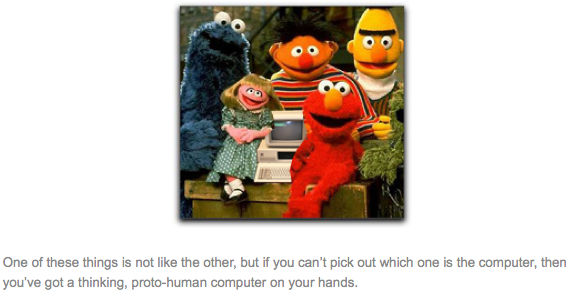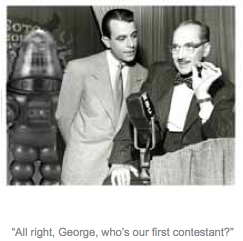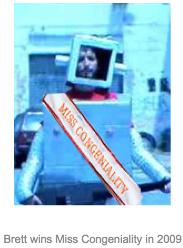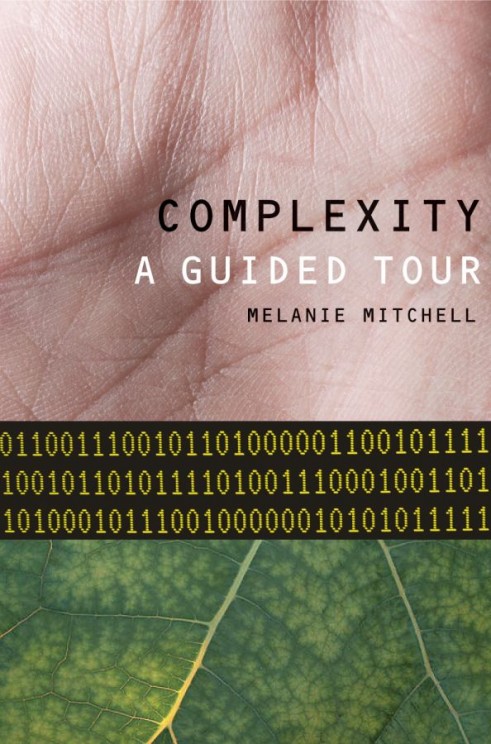new posts in all blogs
Viewing: Blog Posts Tagged with: AI, Most Recent at Top [Help]
Results 1 - 11 of 11
How to use this Page
You are viewing the most recent posts tagged with the words: AI in the JacketFlap blog reader. What is a tag? Think of a tag as a keyword or category label. Tags can both help you find posts on JacketFlap.com as well as provide an easy way for you to "remember" and classify posts for later recall. Try adding a tag yourself by clicking "Add a tag" below a post's header. Scroll down through the list of Recent Posts in the left column and click on a post title that sounds interesting. You can view all posts from a specific blog by clicking the Blog name in the right column, or you can click a 'More Posts from this Blog' link in any individual post.
The Wild Robot by Peter Brown
Read by Kate Atwater
Hachette Audio, 2016
AudioFile Magazine Earphones Award Winner
I recently reviewed The Wild Robot for
AudioFile Magazine. You can read my full review and hear an audio excerpt
here. [
http://www.audiofilemagazine.com/reviews/read/110681/the-wild-robot-by-peter-brown/]
The Wild Robot, a novel for ages 8 and up, is a departure from Peter Brown's usual offering of picture books (
Creepy Carrots,
Mr. Tiger Goes Wild,
My Teacher is a Monster - and more), but his customary excellence is just as apparent.
The link to my review is above, however, I'd like to highlight a few things.
The Wild Robot premise is unique and thought-provoking - a robot designed with AI and programmed for self-preservation and nonviolence, is marooned on an island with animals, but no humans from which to learn. The narrator, Kate Atwater, does a stellar job (
see review) and sounds a bit like Susan Sarandon. The audio book is unique in that the beginning and the closing chapters have sound effects including music and sounds of nature.
Overall, it's very well done! If you'd prefer to check out the print version,
Little Brown Books for Young Readers offers an excerpt of the print version of The Wild Robot here. [
http://openbook.hbgusa.com/openbook/9780316382014]


By: Helena Palmer,
on 1/28/2016
Blog:
OUPblog
(
Login to Add to MyJacketFlap)
JacketFlap tags:
Books,
robots,
Technology,
Philosophy,
robotics,
mathematics,
artificial intelligence,
STEM,
Digital Age,
ai,
*Featured,
Nick Bostrom,
Science & Medicine,
Science and Technology,
John Searle,
scientific progress,
Advances in Technology,
AI Technology,
sentient robots,
chinese room argument,
computer consciousness,
z-consciousness,
Add a tag
There has been much recent talk about a possible robot apocalypse. One person who is highly skeptical about this possibility is philosopher John Searle. In a 2014 essay, he argues that "the prospect of superintelligent computers rising up and killing us, all by themselves, is not a real danger".
The post Does the ‘Chinese room’ argument preclude a robot uprising? appeared first on OUPblog.

By: Charley,
on 1/23/2016
Blog:
OUPblog
(
Login to Add to MyJacketFlap)
JacketFlap tags:
Technology,
Journals,
Justin Richards,
it,
Mathematics,
artificial intelligence,
computer science,
computing,
ai,
cyber security,
*Featured,
Science & Medicine,
information technology,
The Computer Journal,
BCS,
Steve Furber,
The Chartered Institute for IT,
University of Manchester,
Add a tag
Oxford University Press is excited to be welcoming Professor Steve Furber as the new Editor-in-Chief of The Computer Journal. In an interview between Justin Richards of BCS, The Chartered Institute of IT and Steve, we get to know more about the SpiNNaker project, ethical issues around Artificial Intelligence (AI), and the future of the IT industry.
The post Conversations in computing: Q&A with Editor-in-Chief, Professor Steve Furber appeared first on OUPblog.

By: Helena Palmer,
on 1/22/2016
Blog:
OUPblog
(
Login to Add to MyJacketFlap)
JacketFlap tags:
Books,
robots,
Technology,
Philosophy,
robotics,
mathematics,
artificial intelligence,
consciousness,
STEM,
Digital Age,
ai,
*Featured,
Science & Medicine,
Science and Technology,
John Searle,
scientific progress,
Advances in Technology,
AI Technology,
sentient robots,
chinese room argument,
David Chalmers,
computer consciousness,
CTOM,
Add a tag
Can a robot be conscious? I will try to discuss this without getting bogged down in the rather thorny issue of what consciousness –– really is. Instead, let me first address whether robot consciousness is an important topic to think about. At first sight, it may seem unimportant. Robots will affect us only through their outward behavior, which may be more or less along the lines of what we tend to think of as coming along with consciousness, but given this behavior, its consequences to us are not affected by whether or not it really is accompanied by consciousness.
The post Can a robot be conscious? appeared first on OUPblog.

By: Helena Palmer,
on 1/15/2016
Blog:
OUPblog
(
Login to Add to MyJacketFlap)
JacketFlap tags:
Nick Bostrom,
Science and Technology,
synthetic biology,
scientific progress,
Here be dragons,
Advances in Technology,
AI Technology,
Max Tegmark,
Olle Häggström,
Books,
Technology,
robotics,
mathematics,
bill gates,
artificial intelligence,
Digital Age,
ipcc,
ai,
*Featured,
Science & Medicine,
STEM,
Stephen Hawking,
nanotechnology,
Add a tag
There is a widely held conception that progress in science and technology is our salvation, and the more of it, the better. This is the default assumption not only among the general public, but also in the research community including university administration and research funding agencies, all the way up to government ministries. I believe the assumption to be wrong, and very dangerous.
The post Let us not run blindfolded into the minefield of future technologies appeared first on OUPblog.

By: AlanaP,
on 4/27/2014
Blog:
OUPblog
(
Login to Add to MyJacketFlap)
JacketFlap tags:
Strategies,
artificial intelligence,
Johnny Depp,
mind,
intelligence,
Dangers,
transcendence,
ai,
*Featured,
Nick Bostrom,
Paths,
Science & Medicine,
bostrom,
machine intelligence,
superintelligence,
ykef3fovtby,
86st7_lzs2s,
h9lasfq64e8,
aheywelk_u8,
Books,
movie,
Videos,
Technology,
Philosophy,
Add a tag
In the trailer of Transcendence, an authoritative professor embodied by Johnny Depp says that “the path to building superintelligence requires us to unlock the most fundamental secrets of the universe.” It’s difficult to wrap our minds around the possibility of artificial intelligence and how it will affect society. Nick Bostrom, a scientist and philosopher and the author of the forthcoming Superintelligence: Paths, Dangers, Strategies, discusses the science and reality behind the future of machine intelligence in the following video series.
Could you upload Johnny Depp’s brain?
Click here to view the embedded video.
How imminent is machine intelligence?
Click here to view the embedded video.
Would you have a warning before artificial intelligence?
Click here to view the embedded video.
How could you get a machine intelligence?
Click here to view the embedded video.
Nick Bostrom is Professor in the Faculty of Philosophy at Oxford University and founding Director of the Future of Humanity Institute and of the Program on the Impacts of Future Technology within the Oxford Martin School. He is the author of some 200 publications, including Anthropic Bias, Global Catastrophic Risks, and Human Enhancement. His next book, Superintelligence: Paths, Dangers, Strategies, will be published this summer in the UK and this fall in the US. He previously taught at Yale, and he was a Postdoctoral Fellow of the British Academy. Bostrom has a background in physics, computational neuroscience, and mathematical logic as well as philosophy.
Subscribe to the OUPblog via email or RSS.
Subscribe to only technology articles on the OUPblog via email or RSS.
The post The viability of Transcendence: the science behind the film appeared first on OUPblog.


By: Nicola,
on 3/22/2012
Blog:
OUPblog
(
Login to Add to MyJacketFlap)
JacketFlap tags:
chatbot,
iGod,
jabberwacky,
peter j bentley,
talking to computers,
the science of computers and how it shapes our world,
turing centenary,
neumann,
internet,
Technology,
alan turing,
artificial intelligence,
computer science,
shannon,
ai,
*Featured,
turing,
Science & Medicine,
Digitized,
Peter Bentley,
Add a tag
By Peter J Bentley
What better way to spend an afternoon than having a friendly chat? My three friends are online chatbots – Artificial Intelligence software designed to analyse my sentences and respond accordingly. All I do is visit a specific webpage, then type into a box in my Internet browser and they reply, just like chatting online to a human. These three (jabberwacky, iGod and ALICE) are some of the more advanced chatbots out there, the result of decades of research by computer scientists to try and achieve intelligence in a computer. From the birth of computers until now, we’ve been trying to make a digital brain that’s clever enough to have a conversation with us. The best we can manage is really nothing more than a database of facts, some basic knowledge of grammar, and a lot of symbol-processing – shuffling of words around in an attempt to find some kind of coherent response. Here’s what we said to each other this afternoon.

Conversation 1:
Me: Hello.
Jabberwacky: Hello, how are you?
Me: I would like to have a chat with you about your parents. Would that be OK?
Jabberwacky: What would you like to chat about?
Me: Did you know that Alan Turing would be 100 years old this year, had he lived?
Jabberwacky: That is very interesting. Do you know that the Philippines has 7100 islands?
Me: I did not know that. However, let’s talk about Turing a little more. You know that Turing suggested something called the Turing Test?
Jabberwacky: No, I did not know that the cat was red…
Me: Right. Well, this was Turing’s way of thinking about how we might judge whether we were talking to an intelligent computer. If we can’t tell the difference between chatting to a computer and chatting to a person, the computer passes the Turing Test. It is intelligent, so Turing suggested.
Jabberwacky: We could all be a figment of imagination of some old guy living in an insane asylum if you think about it.
Me: Yes, I guess that might be true. Anyway, the foresight shown by Turing is remarkable. He was thinking of these ideas at the time that computers were still the size of a large room, and could perform just basic computations compared to today’s machines.
Jabberwacky: Well this must be the part of the film where the noted inception noise comes in.
Me: That might be an appropriate soundtrack for this conversation, you are right. But this is not science fiction, this is computer science fact. It’s a little sad that Turing predicted: “I believe that at the end of the century the use of words and general educated opinion will have altered so much that one will be able to speak of machines thinking without expecting to be contradicted.”
Jabberwacky: Why do you think Jesus is not your savior?
Me: Uh. Anyway, my point is that Turing, for all his genius, did not get this one right. He was not the only one to be overambitious – other pioneers also thought Artificial Intelligence would be achievable much more easily.
Jabberwacky: Who told you that.
Me: Well, recently I wrote a book called Digitized. It’s about the history of computers and I was lucky enough to interview many pioneers for the book. They told me.
Jabberwacky: And what is their history?
Me: I interviewed John Holland – he worked with his supervisor on John von Neumann’s final papers. Holland also got the first PhD in computer science and invented the genetic algorithm. I also spoke to Dave Patterson, the creator of the RAID architecture

By: Lauren,
on 5/5/2011
Blog:
OUPblog
(
Login to Add to MyJacketFlap)
JacketFlap tags:
Technology,
computers,
computer,
alan turing,
artificial intelligence,
Flight of the Conchords,
Dennis Baron,
ai,
A Better Pencil,
*Featured,
computer brain,
computers take over the world,
loebner,
turing,
contestants,
medal,
contest,
science fiction,
Add a tag
By Dennis Baron
 Each year there’s a contest at the University of Exeter to find the most human computer. Not the computer that looks most like you and me, or the computer that can beat all comers on Jeopardy, but the one that can convince you that you’re talking to another human being instead of a machine.
Each year there’s a contest at the University of Exeter to find the most human computer. Not the computer that looks most like you and me, or the computer that can beat all comers on Jeopardy, but the one that can convince you that you’re talking to another human being instead of a machine.
To be considered most human, the computer has to pass a Turing test, named after the British mathematician Alan Turing, who suggested that if someone talking to another person and to a computer couldn’t tell which was which, then that computer could be said to think. And thinking, in turn, is a sign of being human.
Contest judges don’t actually talk with the computers, they exchange chat messages with a computer and a volunteer, then try to identify which of the two is the human. A computer that convinces enough judges that it’s human wins the solid gold Loebner medal and the $100,000 prize that accompanies it, or at least its programmer does.
Here are some excerpts from the 2011 contest rules to show how the test works:
 Judges will begin each round by making initial comments with the entities. Upon receiving an utterance from a judge, the entities will respond. Judges will continue interacting with the entities for 25 minutes. At the conclusion of the 25 minutes, each judge will declare one of the two entities to be the human.
Judges will begin each round by making initial comments with the entities. Upon receiving an utterance from a judge, the entities will respond. Judges will continue interacting with the entities for 25 minutes. At the conclusion of the 25 minutes, each judge will declare one of the two entities to be the human.
At the completion of the contest, Judges will rank all participants on “humanness.”
If any entry fools two or more judges comparing two or more humans into thinking that the entry is the human, the $25,000 and Silver Medal will be awarded to the submitter(s) of the entry and the contest will move to the Audio Visual Input $100,000 Gold Medal level.
Notice that both the computer entrants and the human volunteers are referred to in these rules as “entities,” a word calculated to eliminate any pro-human bias among the judges, not that such a bias exists in the world of Artificial Intelligence. In addition, the computers are called “participants,” which actually gives a bump to the machines, since it’s a term that’s usually reserved for human contestants. Since the rules sound like they were written by a computer, not by a human, passing the Turing test should be a snap for any halfway decent programmer.
 But even though these Turing competitions have been staged since 1991, when computer scientist Hugh Loebner first offered the Loebner medal for the most human computer, so far no computer has claimed the go
But even though these Turing competitions have been staged since 1991, when computer scientist Hugh Loebner first offered the Loebner medal for the most human computer, so far no computer has claimed the go

By: Michelle,
on 11/10/2010
Blog:
OUPblog
(
Login to Add to MyJacketFlap)
JacketFlap tags:
robots,
santa,
Science,
ants,
tour,
melanie,
artificial intelligence,
mitchell,
systems,
ai,
The Oxford Comment,
complexity,
*Featured,
melanie mitchell,
phi beta kappa,
science book award,
guided,
Add a tag
 Congratulations to Melanie Mitchell, who received the 2010 ΦBK Science Book Award for her book Complexity: A Guided Tour! In honor of this, Michelle and Lauren talk with Mitchell about ants, robots, the economy, and more.
Congratulations to Melanie Mitchell, who received the 2010 ΦBK Science Book Award for her book Complexity: A Guided Tour! In honor of this, Michelle and Lauren talk with Mitchell about ants, robots, the economy, and more.
Melanie Mitchell is Professor of Computer Science at Portland State University and External Professor and Member of the Science Board at the Santa Fe Institute. Her research interests include artificial intelligence, machine learning and complex systems.
Subscribe and review this podcast on iTunes!
From the Phi Beta Kappa Society:
Amazing feats of collective intelligence, such as the colony of army ants that link themselves together to cross daunting precipices, are having an unconventional effect on the future of science. The “complexity” of these naturally occurring events cannot be explained by the traditional method of breaking science down into its most basic parts, in this case, the individual army ants. Instead, the study of complex systems, those made up of simple components with limited capacity for communication, provide a much broader illustration of the science of self-organization and adaptation.
In
Complexity: A Guided Tour (Oxford University Press, 2009), Melanie Mitchell draws on her background as a computer scientist and her work with the Santa Fe Institute to study the complex systems that have evolved in nature and how they may contribute to the future of computer programming, specifically with regards to artificial intelligence. Mitchell also looks at the human brain’s ability to create consciousness from a complex network of electrically charged neurons, axons, and dendrites, as well as the immune system’s unique collection of cells, which work together in an effective and efficient way without any central control.
The song featured in this podcast is “In the Middle” from the album Can’t You See by The Ben Daniels Band. Get it here.



By: LaurenA,
on 4/7/2010
Blog:
OUPblog
(
Login to Add to MyJacketFlap)
JacketFlap tags:
fiction,
The,
College,
80,
Manhattan,
Robert,
Geraci,
Rokk,
level,
sci,
fi,
Life,
science fiction,
robots,
Technology,
Science,
apocalypse,
A-Featured,
Western Religion,
World,
of,
aliens,
Warcraft,
Second Life,
World of Warcraft,
Leisure,
sci fi,
Second,
AI,
Apocalyptic AI,
level 80,
Manhattan College,
Robert Geraci,
skynet,
The Rokk,
Apocalyptic,
Add a tag
Lauren Appelwick, Publicity
Robert M. Geraci is Assistant Professor of Religious Studies at Manhattan College. In his new book Apocalyptic AI: Visions of Heaven in Robotics, Artificial Intelligence, and Virtual Reality, he examines the “cyber-theology” which suggests we might one day upload our minds into robots or cyberspace and live forever. Drawing on interviews with roboticists, AI researchers, Second Life devotees, and others, Geraci reveals that the idea of Apocalyptic AI is strikingly similar to Judeo-Christian apocalyptic traditions. Here, he shares 10 ways World of Warcraft, one virtual reality game, could help us survive the end of the world as we know it.
1. The dangers will be minimal…level 80 priests can provide universal health care.
President Obama plans to insure 32 million more Americans than are currently protected; but the area of effect healing spells of priests can jump from one person to another, healing them as they become sick and injured without need for hospital visits, insurance payments, etc. This approach to medical treatment has obvious benefits over the constant paperwork that federally mandated insurance will require.
2. When aliens come to take over the planet, they’ll get addicted to WoW and forget what they were doing.
Instead of world domination, aliens will hope to complete all four daily cooking quests for The Rokk. After they’ve already eaten Emeril, they’ll spice up their life with Super Hot Stew and realize that people don’t taste all that good after all.
3. Who needs indoor plumbing? You’re already used to peeing into bottles.
Your guild’s “friendly” three day race to level 80 has given you all the continence you need…and the willingness to do what you must when the time comes.
4. After countless hours of farming for minerals, herbs and animal hides, you’re well prepared for life after subprime mortgages collapse the economy.
Let’s face it, the economy is in shambles and no one knows when it will recover. On the other hand, while toxic mortgage securities provide neither housing nor security, a proper skinner can ensure that all the local children stay warm through the winter.
5. Gnomish engineers will program the robots to like you (though they can’t guarantee proper functioning).
It’s not the Gnomes’ fault that Skynet became self-aware…they didn’t think it would defend that off switch so vociferously! And to compensate, they’ll happily upload your mind into one of their inventions so that you can join the robots in their post-apocalyptic future.
6. As the value of the dollar declines, gold and mithril will remain safe investments.
Gold will shine through the darkest of times and foreign governments will always be content to buy it from you at the auction house.
7. Your family pet can take aggro for you while you lay a fire trap to destroy a zombie mob.
A lifetime of treats and petting repaid in one priceless moment.
8. Your potions of underwater breathing will let you grab the a
 October 21, 1947- March 19, 2010
October 21, 1947- March 19, 2010
Poet
My poems come from the unconscious – I'm irrevocably tied to the lives of all people, both in and out of time.
Dread (W. W. Norton & Co., 2003); Vice (1999), which won the National Book Award for Poetry; Greed (1993); Fate (1991); Sin (1986), which won an American Book Award from the Before Columbus Foundation; Killing Floor (1979), which was the 1978 Lamont Poetry Award of the Academy of American Poets; and Cruelty (1973).
Best American Poetry
Modern American Poetry
She must know the weight of a man's hand,
the bruises that are like the wounds of Christ. Her blood that is black at the heart
must flow until it is as red and pure as His. And she must be pregnant always
if not with child
then with the knowledge
that she is alive because of you. That you can take her life
more easily than she creates it,
That suffering is her inheritance from you
and through you, from Christ,
who walked on his mother's body
to be the King of Heaven. — “The Mother's Tale,” Sin (1986)













很有趣~~感覺很好的blog,祝您人氣長虹 ........................................